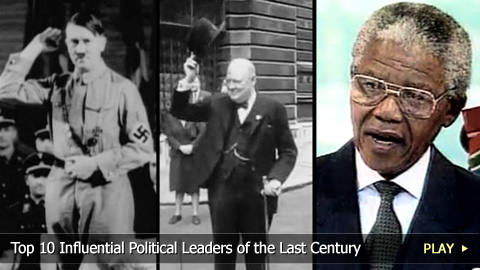Top 10 Influential Political Leaders of the Last Century

1910s: Vladimir Lenin, Russia
After founding the Bolsheviks faction of the Marxist Russian Social Democratic Party, Lenin was instrumental in overthrowing Russia’s provisional government during the 1917 October Revolution. As leader of the first constitutionally socialist state, Lenin put in place numerous political and economic reforms that forever changed the Russian Socialist Federative Soviet Republic. Though considered a dictator, the former Premier of the Soviet Union left a lasting impact on Communism and history.
1920s: Mahatma Gandhi, India
Gandhi observed much racial discrimination while working as a lawyer in South Africa. This inspired him to lead his fellow Indians in non-violent campaigns and protests to improve their rights and freedoms when he was the head of the Indian National Congress in the early 1920s. While it took several decades, India’s independence from Britain was eventually achieved due to Gandhi’s efforts and determination.
1930s: Adolf Hitler, Germany
Following the Nazis’ failed 1923 coup attempt, Hitler got another chance to spread his German nationalism, as well as his anti-capitalist, anti-communist and anti-Semitic views: he was named Chancellor of Germany’s coalition government in 1933. As leader of the Third Reich, the dictator ruled over a totalitarian state and established concentration camps for the opposition. He then triggered World War II when Germany and the Soviet Union invaded Poland in 1939.
1940s: Winston Churchill, United Kingdom
While he made some questionable World War I decisions, the British Bulldog redeemed himself during the Second World War with his invaluable leadership skills. As Prime Minister, Churchill motivated the British people to keep fighting the Nazis. It was thanks to his willpower and his formation of the Grand Alliance with United States President Franklin Delano Roosevelt and the Soviet Union’s Joseph Stalin that the war was finally brought to an end.
1950s: Kim II-sung, North Korea
Kim had only been North Korea’s Premier for a few years when the first statues of him appeared. In 1950, the “Great Leader” led the invasion of South Korea, which resulted in over one million deaths within three years. While he tried to help North Korea’s economy, the Communist leader also established a strong military presence, prison camps and the use of executions during his rule. His autocratic government helped pave the way for his future presidency.
1960s: Fidel Castro, Cuba
With Castro as Prime Minister, the ‘60s saw Cuba become a socialist state and build ties with the Soviet Union. After the American-funded Bay of Pigs Invasion failed, Castro strengthened his Marxist-Leninist beliefs and communist policies, which spurred the next year’s Cuban Missile Crisis. Despite his regime’s repression of the opposition, its anti-imperialism and revolutionary action, Castro also helped increased Cuba’s global influence.
1970s: Mao Zedong, China
As founder of the People’s Republic of China, Chairman Mao planned to modernize his one-party socialist state and nationalize its industries through the Great Leap Forward. When that failed, he launched the Cultural Revolution, hoping to reinforce his power, spread communism and remove dissidents. While his health deteriorated in the ‘70s, the period marked the transition between Mao’s China and the China of today, which continues to experience massive economic growth.
1980s: Ruhollah Khomeini, Iran
After leading the coup d’état against Shah Mohammad Reza Pahlavi during the Iranian Revolution, Ayatollah Khomeini became Iran’s Supreme Leader. His political and religious power was so great that Iraq invaded the country hoping to prevent his Islamic revolution. Later that decade, Khomeini ensured his leadership was secure by executing thousands of political prisoners. He further championed the Islamic cause by requesting Salman Rushdie’s death after Muslims accused the author of blasphemy.
1990s: Nelson Mandela, South Africa
Following 27 years in jail for his anti-apartheid views, Mandela was finally released in 1990. He then helped end apartheid in South Africa as president of the African National Congress and, thanks to the country’s first democratic and multi-racial elections, he eventually became the first black South African president. While he focused on rebuilding the economy, uniting citizens, and investigating human rights abuses, he also brought his country onto the world stage.
2000s: George W. Bush, U.S.A.
Following in his father’s footsteps, Dubya became the 43rd President of the United States. The former Texas governor concentrated on tax cuts, socially conservative initiatives and education reform. But it was 9/11 and his global War on Terrorism that really marked his presidency. Despite this controversial move, Bush was elected for a second term and was put to the test with events like Hurricane Katrina and a lengthy recession.
Do you agree with our list? Who do you think are the most influential political leaders of the last century? Be sure to subscribe to WatchMojo.com for more entertaining top 10s.
